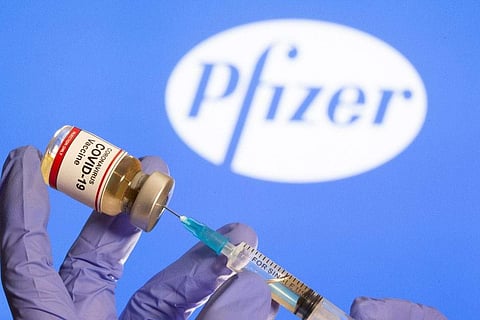

The UK on Monday began rolling out the Oxford University vaccine developed by AstraZeneca as protection against COVID-19, with an 82-year-old Oxford-born dialysis patient becoming the first to receive the new jab. Brian Pinker is among the first to be vaccinated by the Oxford University Hospital's (OUH) chief nurse, hailed as a major milestone in the phased vaccination programme being undertaken by the National Health Service (NHS) as the Oxford jab became the second vaccine approved for rollout after the Pfizer/BioNTech vaccine.
A retired maintenance manager who has been having dialysis for kidney disease at the hospital for a number of years, Pinker said he was pleased to be getting protection against the virus, giving him peace of mind as he continues to receive treatment. "I am so pleased to be getting the COVID-19 vaccine today and really proud that it is one that was invented in Oxford. The nurses, doctors and staff today have all been brilliant and I can now really look forward to celebrating my 48th wedding anniversary with my wife Shirley later this year," he said.
Alongside Pinker, music teacher and father-of-three Trevor Cowlett, aged 88, and Professor Andrew Pollard, a paediatrician working at OUH who also pioneered the Oxford jab, are among the first to be vaccinated on Monday. "The Oxford vaccine is a triumph of British science and I want to thank everyone involved in its development and production," said UK Prime Minister Boris Johnson. "We know there are challenges still ahead of us over the coming weeks and months, but I'm confident this is the year we will defeat coronavirus and start building back better," he said.
Professor Pollard, Director of the Oxford Vaccine Group and Chief Investigator of the Oxford Vaccine Trial, said: "It was an incredibly proud moment for me to have received the actual vaccine that the University of Oxford and the AstraZeneca teams have worked so hard to make available to the UK and the world. "As a paediatrician specialising in infections, I know how important it is that healthcare workers along with other priority groups are protected as soon as possible a crucial role in defeating this terrible disease".
"This will be a historic day, and cause for celebration, but it's vital everyone continues to follow the rules and remember hands, face, space, to keep ourselves and others safe," he said, warning that the new variant of the deadly virus still remains a major risk to the NHS services. The first Oxford AstraZeneca vaccinations will be delivered at a small number of hospitals for the first few days for surveillance purposes, as is standard practice, before the bulk of supplies are sent to hundreds of general practitioner (GP) led services later in the week.
The NHS is giving GPs an extra 10 pounds for every care home resident that they vaccinate by the end of the month. Thereafter, hundreds of new vaccination sites are due to come onstream this week, joining the 700 which are already in operation. "The NHS' biggest vaccination programme in history is off to a strong start, thanks to the tremendous efforts of NHS staff who have already delivered more than one million jabs," said NHS medical director Professor Stephen Powis.
"Throughout the pandemic their response has been phenomenal from introducing world-leading treatments for coronavirus which have saved patients' lives as well as delivering the very first COVID-19 vaccines outside of a trial in a landmark moment in history, and now rolling out the new Oxford AstraZeneca vaccine, chalking up another world first that will protect thousands more over the coming weeks," he said.
Last week, regulators and the four UK chief medical officers announced that the gap between first and second doses of the Pfizer vaccine should be lengthened so that more people can be protected faster.
Delivery of the Pfizer jab, the first vaccine to be approved, is therefore also now able to be accelerated.
The NHS said it has now vaccinated more people than anywhere else in Europe, including more than one in five people over the age of 80.
It comes as the UK faces challenges of a very rapidly spreading new mutation of coronavirus, which has plunged most of the country into the toughest lockdown restrictions and there is the likelihood of those measures being even further enhanced as infection rates continue to surge.
